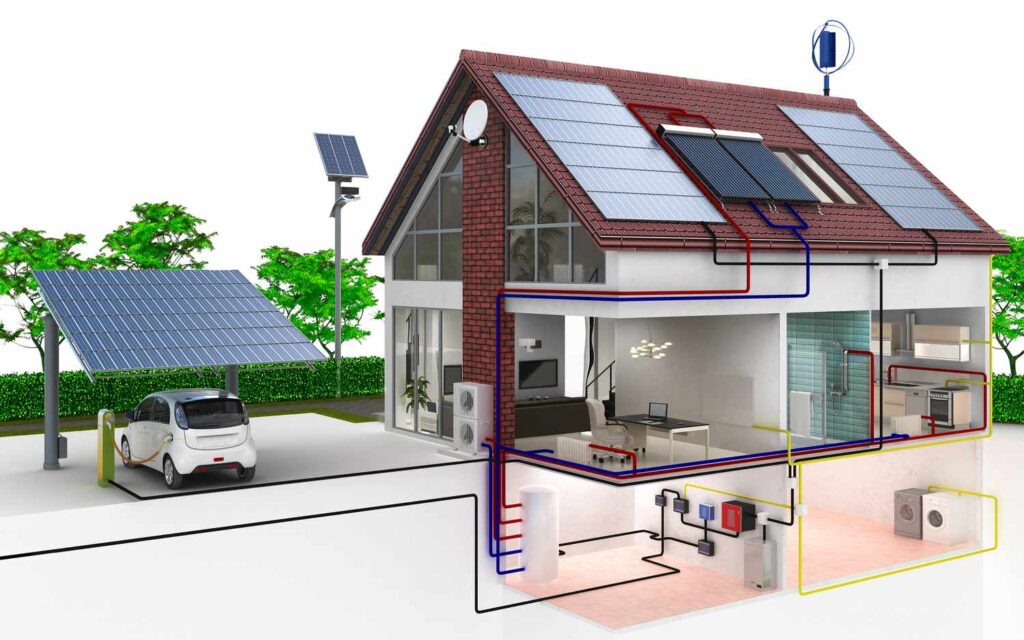As electric vehicles (EVs) become increasingly popular, integrating solar panels and battery storage into your home EV charging setup offers a sustainable and cost-effective solution. By harnessing the power of the sun and storing excess energy, you can maximise your EV’s efficiency, reduce reliance on the grid, and take advantage of potential cost savings. In this article, we will guide you through the key steps involved in planning for home EV charging with solar panels and battery storage.
Assess Your Energy Needs and EV Charging Requirements
Start by evaluating your energy needs and the charging requirements of your EV. Consider factors such as your daily driving distance, charging frequency, and preferred charging time. This assessment will help determine the size of the solar panel system and battery storage capacity needed to meet your energy demands.
Solar Panel System Sizing and Design
Engage with a reputable solar installer who can help design the optimal solar panel system for your home. They will consider factors like available roof space, orientation, shading, and local solar resources to determine the size and configuration of the solar array. A well-designed solar panel system should generate sufficient electricity to power both your household and EV charging needs.
Battery Storage Capacity and Configuration
Discuss with your solar installer the option of incorporating battery storage into your home EV charging setup. Battery storage allows you to store excess solar energy for later use, providing greater energy independence and flexibility. Consider factors such as the desired battery capacity, backup power requirements, and potential incentives or rebates available for energy storage systems.
Charging Infrastructure and Smart Energy Management
Plan the layout and installation of your home EV charging infrastructure. Determine the optimal location for the charging station, ensuring it is easily accessible and compatible with your EV’s charging requirements. Consider using smart charging solutions that integrate with your solar panels and battery storage. These systems can optimise energy flows, charge your EV during off-peak hours or when excess solar energy is available, and provide real-time monitoring of energy usage.
Financial Considerations and Incentives
Evaluate the financial aspects of your home EV charging setup. While the initial investment may be higher with solar panels and battery storage, consider the long-term cost savings and potential incentives. Research available financial incentives, tax credits, or grants offered by local governments or utility companies to offset the upfront costs. Additionally, explore options for net metering or feed-in tariffs that allow you to sell excess solar energy back to the grid, further enhancing the economic benefits of your home EV charging system.
Installation and Maintenance
Once you have finalised your plans, engage a qualified solar installer to proceed with the installation of your solar panels, battery storage system, and EV charging infrastructure. Ensure that all necessary permits and regulations are met during the installation process. Regular maintenance, such as cleaning the solar panels and monitoring the performance of the battery storage system, is essential to optimise the efficiency and longevity of your home EV charging setup.
Planning for home EV charging with solar panels and battery storage offers a sustainable and cost-effective solution to power your electric vehicle. By assessing your energy needs, designing an optimal solar panel system, selecting the right battery storage capacity, and integrating smart energy management, you can maximise energy efficiency and reduce reliance on the grid. Take advantage of available incentives and rebates to offset initial costs and engage qualified professionals for installation and maintenance. Embrace the future of sustainable transportation by planning your home EV charging system with solar panels and battery storage today.
What are solar panels?
Solar panels, also known as photovoltaic (PV) panels, are devices that convert sunlight into electricity. They are composed of multiple solar cells made of semiconductor materials, typically silicon. Solar panels capture sunlight and use the photovoltaic effect to generate direct current (DC) electricity. They are commonly mounted on rooftops or ground-mounted structures to maximise exposure to sunlight. Solar panels come in various sizes and configurations, from small residential panels to large-scale arrays used in commercial and utility-scale installations.
How do solar panels work?
Solar panels work by harnessing the energy from sunlight and converting it into electricity. Here’s a simplified explanation of the process:
- Photovoltaic Effect: When sunlight hits the solar panel’s surface, it excites the electrons in the semiconductor material, typically silicon. This generates an electric current.
- Electron Flow: The excited electrons are captured by the electric field created within the solar cells. The flow of these electrons creates direct current (DC) electricity.
- Inverter Conversion: The DC electricity generated by the solar panels is converted into alternating current (AC) electricity using an inverter. This conversion makes the electricity compatible with the electrical grid or usable for powering appliances and devices in a building.
- Grid Connection: AC electricity can be used to power your home or business. Any excess electricity generated by the solar panels can be fed back into the grid, usually through a process called net metering, allowing you to earn credits or receive compensation for the surplus energy.
The pros and cons of a solar panel system
Pros:
- Renewable Energy Source: Solar panels generate electricity from sunlight, a clean and renewable energy source. Using solar power reduces reliance on fossil fuels and lowers greenhouse gas emissions.
- Cost Savings: Over time, solar panels can significantly reduce or eliminate electricity bills. Once the initial investment is recovered, the electricity generated by solar panels is essentially free.
- Environmental Benefits: Solar panels produce electricity without emitting pollutants or greenhouse gases, contributing to cleaner air and combating climate change.
Cons:
- Initial Cost: The upfront cost of purchasing and installing solar panels can be a significant investment. However, the cost of solar panels has decreased in recent years, and various financing options and incentives are available to help mitigate the initial expenses.
- Weather Dependency: Solar panels rely on sunlight to generate electricity, so their output is affected by weather conditions. Cloudy days or shading can reduce their efficiency, impacting energy production.
- Space Requirements: Installing solar panels requires adequate roof space or land area that is unobstructed by shading. Limited space or shading from nearby trees or buildings can affect the feasibility and efficiency of a solar panel system.
What is battery storage?
Battery storage, also known as energy storage systems (ESS), involves storing excess electricity generated by solar panels for later use. Battery storage allows you to capture and store surplus energy during times of high solar production and use it when sunlight is limited or during peak demand periods. It provides a means to increase self-consumption of solar energy and enhances energy independence.
Battery storage systems consist of rechargeable batteries that store electricity in the form of chemical energy. The stored energy can be discharged when needed, such as during the evening, nighttime, or during power outages. Battery storage offers flexibility, allowing homeowners to use their self-generated solar energy even when the sun is not shining.
Would I benefit from Battery Storage?
The benefits of battery storage depend on individual circumstances and goals. Here are a few factors to consider:
- Increased Self-Consumption: Battery storage enables you to utilise more of your self-generated solar energy. Excess energy produced during the day can be stored and used during the evening or at times when solar production is low, reducing reliance on the grid and maximising cost savings.
- Energy Independence and Backup Power: Battery storage systems provide backup power during grid outages, ensuring a continuous power supply for critical appliances or systems. This can be particularly beneficial in areas prone to power interruptions or for those seeking greater energy resilience.
- Time-of-Use Optimisation: For regions with time-of-use electricity rates, battery storage allows you to store excess solar energy and use it during peak-rate periods when grid electricity prices are higher. This can help offset higher electricity costs and increase savings.
It is important to evaluate your energy usage patterns, the cost of battery storage systems, and any available incentives or financing options to determine if battery storage is a suitable and cost-effective solution for your specific needs.
What is the cost of solar panel systems?
The cost of a solar panel system varies based on various factors, including the system sise, quality of equipment, installation complexity, and location. As of 2023, the average cost of a residential solar panel system in Europe ranges from €4,000 to €10,000 per kilowatt (kW). For example, a typical 5 kW solar panel system might cost between €20,000 and €50,000, excluding battery storage.
The cost of battery storage systems varies depending on factors such as the desired capacity, brand, and additional features. On average, battery storage systems can range from €5,000 to €15,000 per kilowatt-hour (kWh) of storage capacity. For a residential system, the cost of a battery storage system can range from €10,000 to €30,000 or more, depending on the specific requirements.
It’s important to note that while the upfront cost of a solar panel system with battery storage is higher than a system without storage, the addition of battery storage provides benefits such as increased energy independence, backup power, and the ability to optimise energy usage. Additionally, available incentives and financing options can help offset the initial costs and improve the return on investment.
Renewable Energies
As Marbella’s leading provider of Solar Panels and Air Conditioning Marbella Spain systems, Solares Energies is committed to powering your home and business with the latest in sustainable technology. We are renowned for harnessing Marbella’s abundant solar power, delivering unrivalled energy efficiency through our carefully chosen solar panels. We provide not just clean, renewable energy but also an opportunity to contribute to a sustainable future.
What distinguishes Solares Energies in the industry is our comprehensive customer service. From the moment you reach out to us for a consultation to the installation and continued maintenance of our systems, our expert team is there to guide you every step of the way. We also supply advanced air conditioning systems to ensure your comfort during Marbella’s hot summers, without the concern of excessive energy consumption. These cutting-edge systems, along with our solar panels, further bolster your property’s energy-saving capabilities.Looking for the best Solar Panels Marbella Spain has to offer? look no further.
With Solares Energies, you’re embracing more than just solar panels and air conditioning. You’re investing in a greener lifestyle, reducing your environmental impact, and contributing to global preservation efforts—all while enjoying significant savings on your energy expenditures. A journey towards a more sustainable future with Solares Energies, Marbella’s trusted renewable energy solutions provider.






More Stories